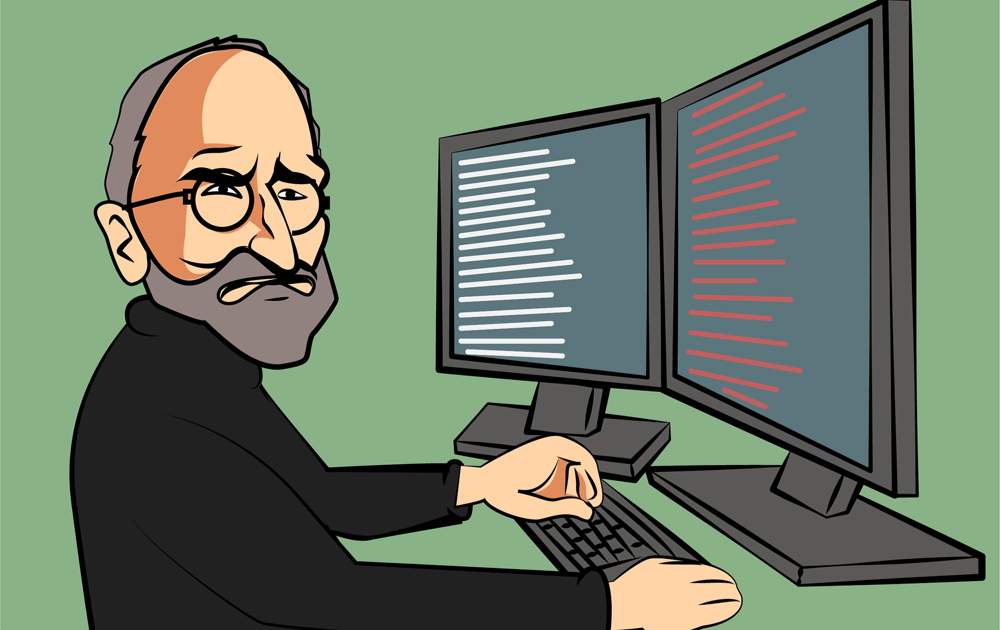Steve Jobs was a genius product guy. I think few would say otherwise about the man behind the iPod, iPhone, and iPad. But given a different turn of events, say if he was born 30 years later and decided to become a software engineer, how would he manage? Do you think he’d reach similar greatness as he did in Apple?
If you read Steve Job’s biography or saw the movie Jobs , then you’d know Steve had some special personality traits. These traits made him an amazing product manager, CEO, negotiator, and leader. But it made me think that if he’d have any kind of leading role in software development, he’d probably be terrible. Let’s consider Steve’s unique personality characteristics. I’ve asked ChatGPT to list them:
- Creativity: Steve was known for his ability to think outside the box and come up with innovative solutions to problems.
- Innovation: Jobs was always pushing the boundaries of what was possible with technology.
- Vision: Steve had a clear vision for the future of technology and was able to communicate that vision to others. He could see the potential in new technologies and bring them to the masses in a way that was both user-friendly and visually appealing.
- Perfectionism: Jobs was known for his intense focus on detail and design. He was a perfectionist and would not settle for anything less than the best. This often meant that he would push his employees to their limits, resulting in frustration but always a product of the highest quality.
- Charisma: Jobs had a magnetic personality and was able to inspire and motivate his employees.
- Demanding: While Jobs was known for his charisma and ability to inspire, he could also be demanding and difficult to work with at times. He was not afraid to push people to achieve their best.
- Strong Design Aesthetics: Jobs had a deep appreciation for aesthetics and believed that good design was not limited to how a product looked but also how it worked. He brought a sense of elegance and simplicity to Apple’s products, setting them apart from competitors.
I’d also add to this list 9. A polarized view of the world and 10. Manipulative personality. Steve had a way of categorizing employees into gods or shitheads. This means you either could do no wrong or everything you do is absolute shit. These statuses could change; gods could become shitheads and vice-versa. That attitude, along with his passion and charisma, encouraged a needy culture where the gods understood they weren’t gods but tried to do as much as they could to stay gods, whereas the shitheads jumped through hoops to try and raise their status.
I’ll add 11. Believed in a closed system with vertical integration as well. Steve thought a product could be good only when the software and hardware were developed as a whole unit. Jobs refused to license the Mac OS to other OEMs, except for a couple of niche companies. And he objected for a long time to putting the App Store on the iPhone, claiming that 3rd-party apps wouldn’t be able to uphold to iPhone’s high quality. Having said that, Jobs relented on many counts. He relied on Intel for Mac hardware, and on ARM for the iPhone and iPad, until they were finally replaced (after his death) with the M1 chips .
Steve Jobs as a Software Engineer
Let’s imagine Steve in the role of a software engineer in today’s time, and give him some moderate amount of responsibility. Maybe a technical lead, a team lead, or a mid-level manager. Do you think Steve would do well in those positions? I think that he would be mostly a destructive personality, and the same skills that made him a genius innovator would have him wreak havoc in this imaginary role. To explain, let’s go over some of his personality traits again:
- Perfectionism is a problematic quality in software, especially if you obsess over each implementation detail. Unlike a user-facing product or a static structure like a bridge, code is a dynamic entity that changes all the time, and striving for perfection is impossible. Imagine Steve arguing for hours on end, during pull requests and design reviews, that some class should use the singleton pattern instead of static functions. Now scale it to every step in the development process.
- Steve was extremely demanding towards his employees. That meant driving them to the very edge of their abilities, whether it was asking them to redesign something 30 times, calling them in the middle of the night, or expecting them to work countless hours. In today’s world, the power belongs to the employees, where good engineers have a lot of great options in front of them. You might be able to get away with that in a cutting-edge tech company in the 80s, but not today.
- Manipulative and Polarized - Steve would consistently declare ideas as “stupid” when presented to him. Sometimes, he would change his mind, but in doing so the idea became his own and not yours. That was one of the quirks he had, that probably wouldn’t fly today. Back then, when you were a small team that developed world-changing technology, engineers would live on nothing but coffee and passion. But today, most engineers work on something like a SaaS product that creates cool dashboards for business managers. I don’t mean to belittle modern software engineering (or dashboards), but would you be willing to put up with such humiliation to keep that job?
- Vertical integration and closed systems - Those notions are problematic in today’s software systems. Every modern project relies on a mountain of dependencies, including open-source libraries, 3rd party databases, cloud providers, deployment frameworks like Kubernetes, etc. Imagine a software engineer that would argue for every dependency that you can implement yourself. I can just about imagine Steve yelling that we should implement our own SQL database, tailored to our needs.
Granted, Steve also had amazing qualities that would do good in any field, like Creativity and Vision. He also famously possessed a reality distortion field that allowed him to convince anyone of anything, no matter how unlikely. In our example of developing dashboards in a SaaS product, it’s quite possible Steve would be able to convince his team that these dashboards are a revolutionary product about to change the world.
We also consider it a given that Steve would become a software engineer. But if Steve was born 30 years later, I think it’s far more likely that he’d find himself in a Product manager role, sales, entrepreneur, or CEO.
I also think that even if Steve did become a software engineer in today’s world, some of the qualities listed above would change. For example, I doubt he would stick to his rigid vertical integration philosophy. But other qualities, like his perfectionism, were rooted in childhood, way before he was involved in tech. For example, he would go on repair jobs with his father and marvel at how perfect the details of some door or fence were, even for parts of the work that the customer couldn’t see. You might know the famous story of Steve insisting that all of the wiring on the Apple 1 circuit board would be straight and consistent, even though they were completely hidden and didn’t affect the computer’s functionality.
So that’s my 2 cents on a question nobody asked, but I found interesting after reading his biography. Share your thoughts in the comments. Cheers.






good post